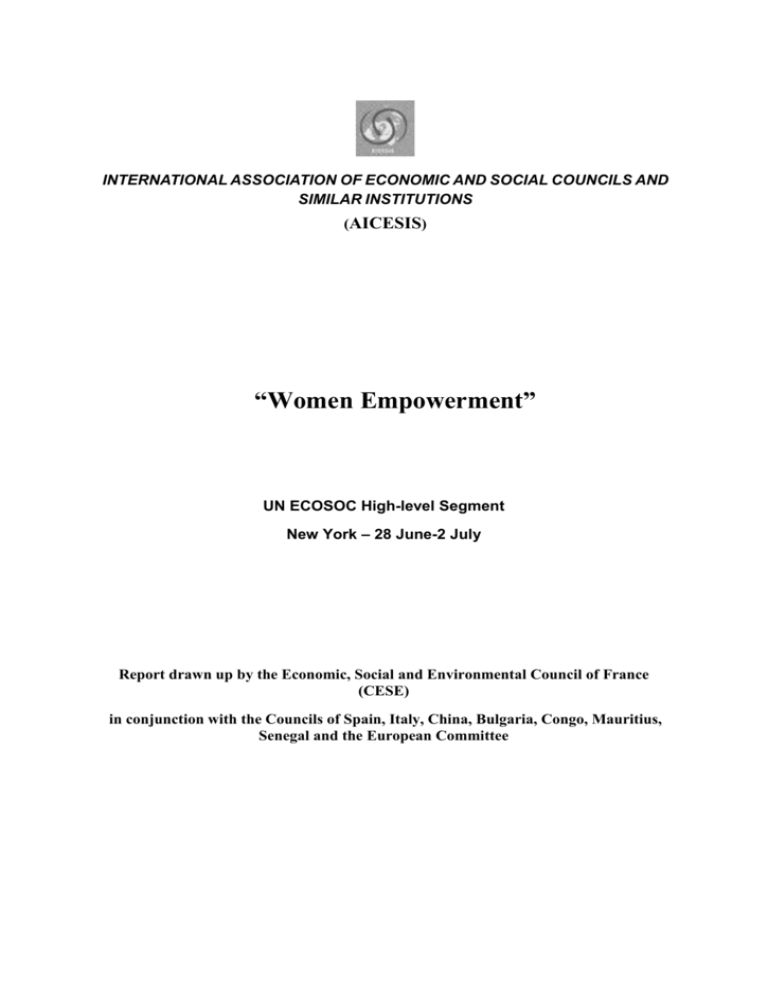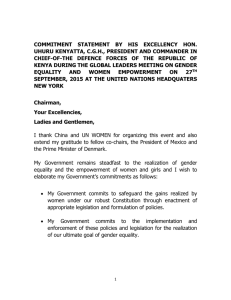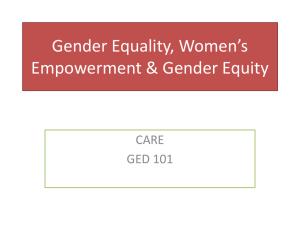The AICESIS position on gender equality and empowerment of women
advertisement

INTERNATIONAL ASSOCIATION OF ECONOMIC AND SOCIAL COUNCILS AND SIMILAR INSTITUTIONS (AICESIS) “Women Empowerment” UN ECOSOC High-level Segment New York – 28 June-2 July Report drawn up by the Economic, Social and Environmental Council of France (CESE) in conjunction with the Councils of Spain, Italy, China, Bulgaria, Congo, Mauritius, Senegal and the European Committee -2The AICESIS position on gender equality and empowerment of women The discussion theme for the UN Economic and Social Council's General Assembly on 5 July 2010 is to be, "Current global and national trends and challenges and their impact on gender equality and empowerment of women". This choice confirms the fact that equality between women and men is both a cardinal social value and a prerequisite for development. As early as last March, the UN Economic and Social Council's Commission on the Status of Women (UN CSW54) discussed progress and the remaining challenges to be addressed to implement the Beijing Declaration and Platform for Action 15 years on from their adoption in 1995. This anniversary comes at a time of great economic and social difficulties for millions of women and men from both the developed and the less-developed world, who are victims of a financial crisis which reduced global economic production in 2009 to a level unparalleled since the end of the Second World War. It is significant that one of the key Millennium Development Goals adopted at the United Nations Millennium Summit in September 2000 is that of "Promoting gender equality and the empowerment of women", which means, in specific terms, eradicating the disparities between girls and boys in primary and secondary education and eliminating inequalities between women and men with regard to health. In this connection, reference must also be made to the UN CSW/ECOSOC Agreed Conclusions on Financing for Gender Equality and the Empowerment of Women (2008) and Eradicating poverty, including through the empowerment of women throughout their life cycle, in a globalising world (2002), which stress how it is becoming increasingly clear that investing in policies to help women and girls boosts productivity, efficiency and sustainable economic growth, and that greater economic empowerment of women is a key factor in achieving the Millennium Goals and eradicating poverty. Gender equality therefore has multiple dimensions, which need to be approached holistically. Governments certainly have a primary responsibility in this area, both in the developed and developing countries. However, the social partners also play a role in promoting equality through the social dialogue and collective bargaining, together with civil society, which, given the nature of the issues concerned, must also be able to play a significant role. This report draws, in particular, on the contributions made by a number of social partner organisations, notably, the European Economic and Social Committee, the Italian CNEL and the Economic and Social Councils of Bulgaria, France, Mauritius, Senegal and the Congo. I The context: although some progress has been made, there are still major inequalities between women and men 1. In industrialised countries the issues of work-life balance and the pay gap go hand in hand with individual and collective empowerment of women in the workplace, institutions and society. In these countries, the most striking aspect is the millions of women working on atypical contracts such as part-time or fixed-term contracts, who are therefore even more vulnerable to job losses, have no protection network and are in danger of falling into a situation of poverty affecting both individual and family. EN -3In developing countries, over the past few years, significant progress has been made towards greater equality between women and men in the development context. Gender equality is now included as one of the subjects addressed in the dialogue with partner countries in connection with development cooperation. In addition, work on establishing the gender equality programme has also progressed. However, the situation is still worrying. 2. In this regard, a number of indicators are worth flagging: According to an OECD document, of the 113 countries which did not manage to ensure parity between girls and boys in primary and secondary education by the target date of 2005, only 18 are likely to reach the target in 2015. In developing countries, girls have on average 11% less chance of going to secondary school than boys. Health statistics reveal an even wider gender gap. According to a European Commission report, in sub-Saharan Africa 60% of HIVpositive adults are women and among young people, 75% of the newly infected with AIDS are girls. As the 2008 UN Millennium Goals Report observes, each year more than 500,000 potential mothers die in childbirth or following complications in pregnancy. The injustice of this situation is exacerbated by the fact that in most of these countries, women play an important role in society and the economy. In Africa, for example, women represent 52% of the total population, but do 75% of the agricultural work and produce and market 60 to 80% of the food. According to some estimates (Department for International Development, 2007), in Sub-Saharan Africa, farm productivity could be increased up to 20% if women had the same access as men to resources such as land, seed and fertiliser. Yet, globally, more than two-thirds of those who are illiterate are women. It has been calculated that children whose mothers have had five years of primary education have a 40% higher chance of surviving beyond the age of 5. II Guidelines for a gender equality strategy A gender equality strategy needs to combine two approaches: on the one hand, mainstreaming across all development cooperation policies and, on the other, the adoption of a whole series of specific objectives. 1. In relation to mainstreaming, a key guideline for the gender equality strategy is that gender issues should be integrated into all aspects of development policies. It is therefore important that all the institutions involved in development cooperation, in the framework of the principles and commitments defined in the 2005 Paris Declaration, point 42 of which mentions the close links between development aid effectiveness and gender equality establish effective dialogue with the key players during the preparation of aid programmes, and, in particular, that public stakeholders, during the programme definition, management and monitoring phases, bring to bear their own national equal opportunities mechanisms, introduce mutual accountability mechanisms, use performance indicators, and make financial incentives dependent on indicators that highlight the impact and results of the individual initiatives undertaken and financed. In this context, greater synergy between public and private development aid flows is needed. It is also important for partner countries to be given -4better access to training, information and good practices on gender issues. In this way, gender equality should be fully integrated into the implementation of development cooperation, within both the European Union and the OECD and United Nations settings. The European Commission in particular must continue to promote women's rights at international level through its foreign and development policies. The gender dimension should be included in all aspects of cooperation, with specific measures for women, promoting their involvement in decision-making processes and their sense of initiative, and the capacity of developing countries to take on the task of promoting equality should be boosted. The gender dimension should form part of the European Security and Defence Policy (ESDP), for action in crisis situations. In the field of humanitarian aid (ECHO), the Commission should pay particular attention to women with children or dependent relatives in the event of natural disasters and to women who have suffered violence at the hands of men in times of upheaval. 2. With regard to sectoral policies, there are a number of areas in which gender inequality is still particularly acute: a) access to education: this is an area where gender inequality is connected with women's obligation to perform daily domestic work and with other traditional cultural practices. Appropriate measures that can be introduced include the abolition of school fees and the introduction of measures to promote both girls' education and adult literacy; b) health: women have limited access to basic healthcare services, particularly in the areas of reproductive and sexual health. Steps therefore need to be taken both to promote welfare protection systems for women and to protect sexual and reproductive health (i.e. HIV/Aids prevention campaigns and training for traditional midwives to reduce infant and maternal mortality in rural areas); c) employment and economic activity: very often, in developing countries, the majority of women work in informal sectors where productivity and incomes are low, working conditions difficult and social protection limited or non-existent. It is particularly important to examine the share of public financing allocated for promoting the economic and social emancipation of women and for equal treatment of women and men as workers. To ensure and improve women's financial independence, both the quantity and the quality of female employment should be improved, including support for the selfemployed. The risk faced by women of falling into a precarious situation must be addressed and a fair distribution of family and domestic responsibilities encouraged. Moreover, as regards the main barriers to gender equality in industrialised countries (reconciliation of private and professional life and pay gap, atypical contracts), promotion of proper representation of women in political, economic and trade-union decisionmaking bodies, in collective bargaining and in social dialogue is essential. -5In both emerging and in many industrialised countries job protection networks need to be strengthened, combating forms of insecurity and gaps in social protection networks which, under the impact of the crisis, exacerbate conditions for working women. The crisis is prompting the world economy to explore new sectors to encourage sustainable economic growth. Of these, the green economy and the knowledge-based economy are best placed to stimulate growth ensuring greater distributive justice, with due regard for gender equality and, therefore, the parameters of the decent work agenda. Another worrying fact is that women entrepreneurs, particularly when launching the businesses they have set up, have difficulty in developing them, owing mainly to insufficient market access. In this case, it is economic operators who are called on to increase women's competitiveness and support their access to national and international markets, in particular where women have limited resources, and to give priority among suppliers to women entrepreneurs as a way of ensuring ongoing income for businesses set up and managed by women. d) farming: countries and the international organisations involved, working together with cooperatives and cooperative organisations, have a key role to play in promoting farming cooperatives by facilitating access for women to sources of funding, land and ownership thereof, sustainable production techniques, investment in farm infrastructure and irrigation, marketing mechanisms and financial support encouraging participation by women in farming activities. e) migration: the gender perspective, full respect for migrant women's human rights and fundamental freedoms, the fight against discrimination and all forms of exploitation, the right to healthcare and the fight against insecure working conditions and violence should be included in public immigration policies and programmes in countries of origin, destination and transit. f) combating violence against women, in particular through reform of legislation in this area, concrete measures to protect victims, training for police and legal personnel and raising awareness in the media. The appropriate social, economic and legal measures need to be used to reduce and eliminate the various factors that foster violence against women, such as a lack of material resources, financial dependence, low levels of education, persistent gender stereotypes, and difficulties in accessing the job market. g) position in society: in many countries, women are marginalised in decision-making as a result of social and cultural barriers stemming from traditional social structures which do not promote changes in the traditional gendered division of power. In order to ensure that women's fundamental rights are protected, legislation on gender equality must be implemented effectively. A firmer commitment is required to achieve gender equality in the decision-making process in the economic, political, scientific and technological spheres. The situation facing women has barely changed in recent years. Clear targets should therefore be set, with deadlines for achieving them, in addition to specific policies and effective measures (such as positive action, equality programmes, specific training, participation quotas, awareness-raising campaigns, etc.). In addition, in order to combat -6gender stereotypes, there is a need to encourage entrepreneurship, innovation and creativity amongst women in all sectors, self-employed, employees and the unemployed. as an important tool to highlight the strengths women bring to society. Particular attention should be paid to the situation in some countries of young girls in order to discourage early marriage and motherhood. 3. In order for these guidelines to be implemented, various measures will need to be introduced to ensure that they are applied effectively. To this end, a number of proposals for priority action are set out below: III. to promote equal pay for equal work or for work of the same value, to enable women to become financially independent; to step up the facilitating role of the public sector in some countries, so as to build an environment conducive to the affirmation and empowerment of women; to adopt appropriate measures to cope with the adverse effect of the economic and financial crisis which cater for women and incorporate the gender perspective, to the benefit of both women and men; to adopt legislative, administrative and financial measures to help women entrepreneurs and women on the labour market, in particular to create a favourable macro-economic environment; to develop and promote gender budgeting and production and use of statistics broken down by gender and age, as well as research into the financial situation of women; to promote legal reform to ensure that the poor, women and men, enjoy equal protection before the law; to support countries to encourage them to ratify and implement the convention on the elimination of all forms of discrimination against women. The contribution of the AICESIS and the Economic and Social Councils Civil society organisations have a considerable role to play in ensuring that this is the case. It will be crucial to specify how these organisations will be involved, both in actually carrying out the measures and in monitoring their implementation. In addition, it is important to define indicators that will enable the donor organisations to make aid payments dependent on the achievement of the gender objectives. Each Council should regularly make proposals to overcome the obstacles faced by women more particularly in the labour market. The issue of gender equality could be the subject of an annual report. The AICESIS therefore calls upon the Member States to include in the redefinition of GDP different indicators which take into account differences between men and women, including care work carried out by women as a source of wealth for all. If any progress is to be made here, it is essential for gender statistics to be introduced. The Economic and Social Councils and other similar bodies will have to discharge their consultative role fully with regard to Parliaments and national governments to promote suitable collective bargaining models, policies and laws. Moreover, in the knowledge that, thanks to the crisis, economic policy decisions are having an increasingly direct effect on working conditions, particularly those of -7women, the ESCs must encourage specific analysis and proposal activities in respect of the policies of international financial institutions to verify and call for their compliance with the gender equality objectives. They will thus be able to act as a "bridge" for civil society organisations operating at national and international levels. In addition, the AICESIS signals the need to strengthen the role of bodies such as the ILO in the framework of a system reconciling the objectives of monetary and financial regulations with the need for sustainable growth that fully incorporates the objectives of social justice and fighting inequality, starting with discrimination against women. Economic and Social Councils – by virtue of their nature and composition – could be in an ideal position to become workshops for innovative practice and monitoring bodies helping to fight and eradicate gender inequality. _____________








